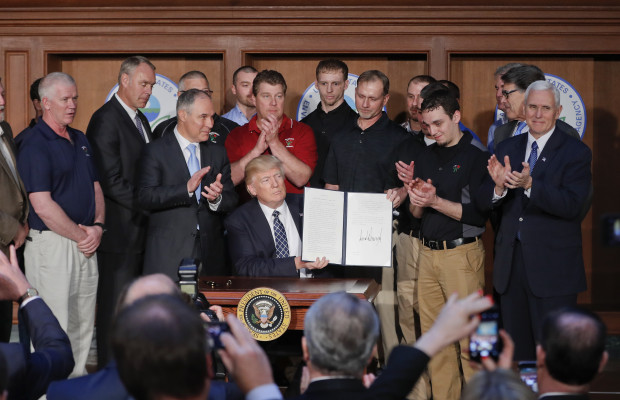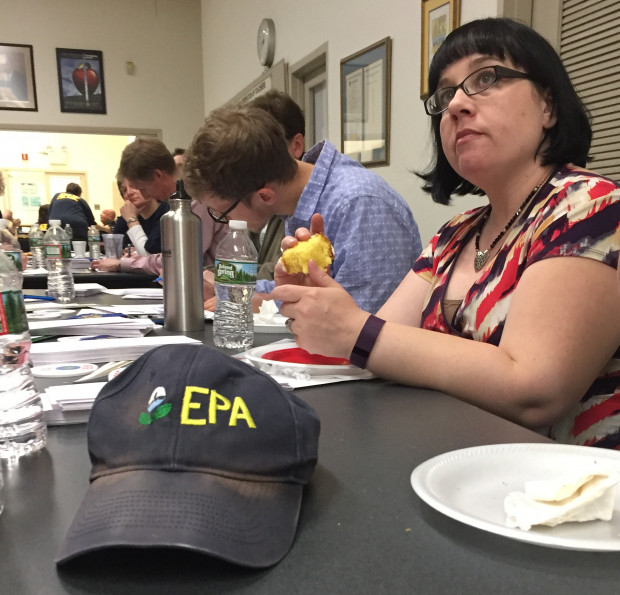EPA union fights back on Trump’s planned budget cuts

AP Photo/Pablo Martinez Monsivais
President Donald Trump, accompanied by Environmental Protection Agency (EPA) Administrator Scott Pruitt, third from left, and Vice President Mike Pence, right, is applauded as he hold up the signed Energy Independence Executive Order, Tuesday, March 28, 2017, at EPA headquarters in Washington.
New reports out of the White House shine more light on the proposed 31 percent cuts to the Environmental Protection Agency. President Trump’s current plan would eliminate 25 percent of EPA jobs. And it would slash water protection programs, including clean-up of the Chesapeake Bay. For the Chesapeake program alone, the new documents show about 40 full-time employees will lose their jobs. And unionized EPA employees are fighting back in a way they haven’t for decades.
It’s lunch hour in Center City Philadelphia, and dozens of people are sitting around tables at the union headquarters for the Philadelphia Federation of Teachers.
These aren’t teachers though. These are scientists, researchers, attorneys, technology professionals, maintenance workers, investigators and enforcement officers. They all work for EPA’s Region 3, headquartered in Philadelphia. They’re writing letters to their representatives in congress about the proposed cuts, something many of them have never done. Lining up at a table, a union official asks where they’re from.
“Are you Pennsy or Jersey?”
“Jersey.”
“You know who your rep is? MacArthur? MacArthur. Gotcha”
Marie Owens Powell hands the union member three letters, two for each of his senators, and one for his congressman. There’s boxes of pizza in the back of the hall, which is buzzing with questions about what addresses to use, and what they can and cannot talk about at work.
Powell is an enforcement officer for EPA. Her job is to go after underground storage tank owners who let liquids like gasoline leak into the soil or nearby waterways.

Susan Phillips / StateImpact PA
EPA union employees gather at the PFT union hall in Philadelphia March 30, 2017 to write letters urging their representatives to not support President Trump's budget blueprint.
She’s also the vice president of the American Federation of Government Employees Local 3631, which represents EPA employees in Pennsylvania, Delaware, Maryland, Virginia, West Virginia and the District of Columbia.
“The mood in the office is fear, dread,” Owens Powell told StateImpact. She says people have come into her office in tears, worried about what the Trump administration will mean for their jobs, and environmental protection in general.
Owens Powell is not new to the EPA, she’s worked at the agency for 27 years. She’s been through other Republican administrations when EPA programs were on the chopping block. But she says this time it’s different.
“Shock,” she said when asked about Trump’s budget blueprint. “It was much worse than anyone of us could have imagined. We all expected that there would be some cuts and some pull back, that’s what we expect. And as career federal employees we keep our head down and get our work done but this is above and beyond what anyone of us could have expected.”
Federal employees are restricted from any kind of political campaigning on the job, on federal property or even while they’re in uniform.
That’s why they’re at the PFT union hall, and had to take time off for letter writing.
Phil Glover, an organizer for AFGE at the national headquarters in D.C. encouraged members to become more politically active.
“You know you can’t say a lot over there on federal property,” said Glover. “So, if you live in an area that has a Republican congressman you have got to go meet with those congressmen and explain what you do.”
Glover tells the group that Pennsylvania Republican Senator Pat Toomey is a key target.
“You gotta get to Senator Toomey,” Glover announced to the room full of about 40 workers. “Make phone calls to his office, we gotta get him to be as pliable as Senator Spector used to be. Cause you used to be able to work with Senator Spector, sometimes it was a little difficult but you could work with him.”
Glover says back when the now deceased Pennsylvania Republican Senator Arlen Spector was in Washington, moderates had more influence. He worries that’s no longer the case. He says it’s clear that Democratic Senator Bob Casey supports environmental protection. But he has no idea where Republican Pat Toomey stands on any of these proposed cuts.
Requests for comment to Toomey’s office went unanswered. But on his website, Toomey says he is supportive of the Trump administration’s budget blueprint generally.
Glover has been with the government employees union since the first Bush administration. He says he’s never seen such a hostile atmosphere toward environmental protection, even under previous Republican presidents.
“There’s been this drive to demonize these folks,” he said. “They’re following the laws that were set by Congress, I mean Congress made the law.”
President Trump says the proposed budget cuts are needed to “ease the burden of costly regulations to industry.” EPA Administrator Scott Pruitt says the plan is to shift the burden of water and air protection to the states, which he says have the resources to take over many of the duties now carried out by the federal government.
But EPA employee Angela McFadden, who works in the water protection division, says federal role is often overlooked.
“EPA plays a critical role in establishing national standards that protect Americans regardless of where they live.”
















